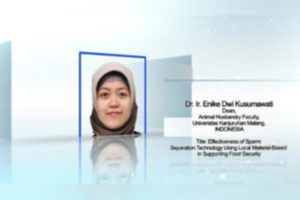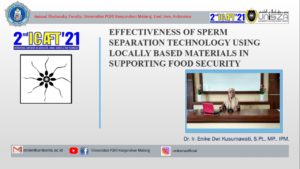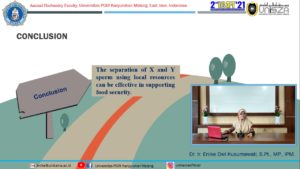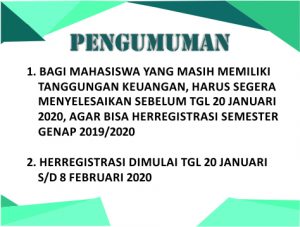 UNIKAMA – Lecturer and Dean the Faculty of Animal Husbandry (Fapet), Universitas PGRI Kanjuruhan Malang (Unikama), Dr. Ir. Enike Dwi Kusumawati, S.Pt., MP., IPM was entrusted with being one of the Keynote Speakers at the 2021 ICAFT International Seminar (International Conference on Agriculture, Animal Sciences and Food Technology) organized by Universiti Sultan Zainal Abidin (UniSZA) Terengganu, Malaysia.
UNIKAMA – Lecturer and Dean the Faculty of Animal Husbandry (Fapet), Universitas PGRI Kanjuruhan Malang (Unikama), Dr. Ir. Enike Dwi Kusumawati, S.Pt., MP., IPM was entrusted with being one of the Keynote Speakers at the 2021 ICAFT International Seminar (International Conference on Agriculture, Animal Sciences and Food Technology) organized by Universiti Sultan Zainal Abidin (UniSZA) Terengganu, Malaysia.
The International Seminar was held on March 2-3, 2021 virtually via WEBEX Event with the theme “Agricultural Innovation for Prosperity & Food Security”. This activity was attended by 141 participants from various countries including Pakistan, Thailand, Mexico, India, Malaysia, Indonesia and other countries.
In this activity, the Dean of Fapet Unikama discussed the effectiveness of spermatozoa separation technology X and Y using local resources in supporting food security.
“The development of biotechnology in the field of livestock reproduction has now experienced various improvements, including the technology of separating spermatozoa carrying X and Y chromosomes. This technology aims to estimate the sex of the child born so that it can be adjusted to market demand,” she said.
Farmers can now determine the sex of the calf before the calf is born using artificial insemination technology with sexing semen. Artificial insemination with sexing semen is the application of artificial insemination using spermatozoa that have separated chromosomes (X chromosome and Y chromosome) so that the sex of the animal to be born can be determined from the start.
“There are also other methods that can be done, among others, is the albumen column. This material replacement can be more economical when compared to other separation methods. This method is cheaper, valid, easier to produce and apply. This method is easy to apply, easy to obtain and affordable, “she explained.
 Separation of spermatozoa by the egg white sedimentation method is based on differences in the motility of spermatozoa X and Y. This method is based on differences in sperm motility X and Y as the implication of differences in mass and size.
Separation of spermatozoa by the egg white sedimentation method is based on differences in the motility of spermatozoa X and Y. This method is based on differences in sperm motility X and Y as the implication of differences in mass and size.
“Selected beef spermatozoa with albumin column has been successfully frozen and can be done commercially. The success of artificial insemination by sexing semen shows encouraging results that the sex of the livestock produced is in line with expectations. So it can be concluded that the separation of spermatozoa X and Y using local resources can be effective in supporting food security, ” she added.
“So there are several questions about the success rate of sexing spermatozoa application in Indonesia using egg white sedimentation. Actually, the results of sexing spermatozoa using egg white sedimentation have been applied in the field and the success is very good and can be accepted by the industry, ” she explained.
The Dean of Fapet also explained that I have done various research related to spermatozoa separation technology X and Y since 2006 until now in collaboration with the Faculty of Animal Husbandry, Universitas Brawijaya, Center for Artificial Insemination in Singosari Malang, Local Grati Pasuruan Beef Cattle Research, and PT Widodo. Makmur Perkasa.
 Furthermore, in the long term, Fapet Unikama also scheduled joint research collaborations with various parties as well as the Faculty of Bioresources & Food Industry, UniSZA Terengganu, Malaysia.
Furthermore, in the long term, Fapet Unikama also scheduled joint research collaborations with various parties as well as the Faculty of Bioresources & Food Industry, UniSZA Terengganu, Malaysia.
“Currently, Fapet Unikama continues to encourage lecturers and students to continue to work and continue to innovate in education and research and apply the results of their research in society and industry,” she concluded.
Related posts:
- Set aside other Universitas, Unikama, take home the Governor’s Trophy of DIY
- Ar-Ridwan Nisa’ held Burdah in Unikama, Participants Rise Up to Twice Drastically
- Implement Government Programs, UNIKAMA Lecturers and Employees Receive Vaccinations
- Unikama Students Pass the 2021 Kemdikbud Teaching Campus Program Selection




